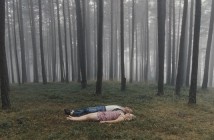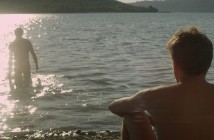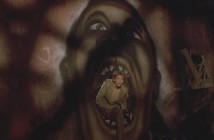
Editor’s Note: reviews this week come from Ronan Doyle and Jaime Burchardt
It’s a David and Goliath week on demand this time, with Netflix’s Disney deal seeing a handful of gigantic titles hit the service just in time to overshadow the latest worthy indies. That’s not to slight the classic cartoons: they are, by and large, the week’s best offerings, their independent counterparts largely too unoriginal and underwhelming to offer much in the way of resistance. It’s worth noting—or, indeed, not—that the DTV sequels to Mulan and The Hunchback of Notre Dame are also new this week.

An Insignificant Harvey
It’s not just for its focus on the trials and tribulations of a little person that An Insignificant Harvey, the debut feature from writer/director Jeff Kopas, earns comparison to Thomas McCarthy’s terrific The Station Agent: it’s for the relatively rural setting of those trials and the aloof mannerisms with which he faces those tribulations. It’s also for the odd friendship struck up with a childish man and an emotionally scarred woman, and the difficulties those relationships face as the characters come to learn as much about themselves as they do about each other. It’s a shame for Kopas, then, that McCarthy’s is the much better film; he hasn’t a bad movie on his hands here by any means, but it’s so similar to The Station Agent that it’s impossible not to compare them. Jordan Prentice’s performance is too good to dismiss just for that, of course, and McCarthy’s writing—though troubled at times—points toward a talent to come. WORTH WATCHING. ~RD

Clandestine Childhood
There’s a prevailing tendency that seems to abound in Spanish-language cinema to frame the horrors of conflict through the innocence of a child. Perhaps it’s the lasting legacy of Spirit of the Beehive, or the titanic success of Pan’s Labyrinth, or simply a convenience of history. Clandestine Childhood, Argentina’s submission for Best Foreign Language Film at this year’s Oscars, continues the trend, observing the left-wing resistance that arose in the wake of president Juan Perón’s death. Based on the childhood experiences of director Benjamín Ávila, who makes his feature debut here, it’s an often affecting and occasionally exciting tale with enough emotional resonance to overcome the dramatic drawbacks of Ávila’s storytelling. Juan, his surrogate, is not an especially interesting character, nor is the love story into which Ávila throws him. The politics and their consequences, thankfully, are a good deal more involving, and ably support the kind of immersion the story itself lacks. WORTH WATCHING. ~RD

Hansel & Gretel Get Baked
It’s not a bad pun, you’ve got to give it that. It is, however, a bad film—very bad, even—though that’s hardly a surprise within the so-called “mockbuster” genre, which sees film parody continuing to reside at the lowest possible point imaginable. It’s typical for films like Jack the Giant Slayer and others based on properties free from copyright to inspire a wealth of cheap cash-ins that hope to trick indiscriminate DVD buyers: see Jack the Giant Killer. Hansel & Gretel Get Baked, at least, is clear to make itself distinct from Hansel & Gretel: Witch Hunters, its weedy narrative a commendable effort to actually win consumers over on the merits of its own potential. It probably won’t, and nor does it deserve to, but the effort is appreciated. It’s a dreadfully unfunny film with a mysteriously decent cast, made tolerable only by director Duane Journey’s decadent appreciation of gore. AVOID IT. ~RD

Hot Coffee
If you remember the case in which an old woman sued McDonald’s for $2.7 million after scalding herself with spilled coffee, chances are you remember thinking how silly it sounded. That’s the thesis of Hot Coffee, which delves in-depth behind the scenes to examine how the media and political spin managed to make frivolous a case whose real details remained shielded from the public. Well structured and convincingly argued, this documentary by Susan Saladoff—a medical malpractice attorney—examines the fog that surrounds tort reform and caps on damages, using four cases to explore various aspects of a difficult debate. Cinematically speaking, it’s a somewhat stale endeavour, but Saladoff is less interested in aesthetics than in educating her viewers, and that she manages brilliantly. This is an important piece of work, an earnest and honest effort to shed light on a deliberately vague civil justice system, and a very successful one at that. RECOMMENDED. ~RD

Mulan
To call Mulan an uncommon pick amongst Disney lovers’ favorite all-time flicks might be stretching it a bit. It might be. It’s an underdog that shouldn’t even be put in that category. The story alone is one for the ages: Fa Mulan is a clumsy but inspired girl that sees her world fall apart when her father, already handicapped from the last time he fought for his country, gets called into battle once more to fight an invading army led by Shan-Yu. She takes his place, and her one defining act of love could be what it takes to save all of China. Give that story to some seasoned filmmakers, some top-notch voice acting by Ming-Na and Eddie Murphy, memorable songs—“Be a Man” will stay in your head for days—and the unrelenting brilliance of composer Jerry Goldsmith, and you’ve got an ideal showcase of epic wonder. HIGHLY RECOMMENDED. ~JB

Pusher
It pains me to admit a certain inability to accurately judge Pusher, adapted as it is from the 1996 Nicolas Winding Refn film of the same name which I haven’t seen. By all accounts the Danish original is a fine film, something this British remake cannot claim to be. Helmed by Luis Prieto and starring Richard Coyle as the dealer living on borrowed time, it’s a disappointingly run-of-the-mill crime thriller with all the usual tropes: a barely-developed love interest; a host of quick-to-violence characters; an awful lot of shouting. Coyle, usually a fine actor, has little more to do here than scream, Matthew Read’s script affording him very little indeed to work with. Prieto is too busy playing with the camera to do much about it; he strives to make pretty and shiny his London locations, but mostly just frustrates with his flippant style. Unlike the original, sequels are unlikely to follow. SO-SO. ~RD

Supporting Characters
Many are the films about screenwriters, as with actors and often directors. From Peeping Tom we have a film about cameramen, and Berberian Sound Studio even gave us one about foley artists. But what of editors: how many films—much less great ones—do we have about editors? Alex Karpovsky and co-writer Tarik Lowe star as an editorial team in Supporting Characters, Daniel Schechter’s enjoyably inventive New York comedy with clear inspiration from Woody Allen. It’s a relatively straightforward story, the men’s own relationship and respective romances put to the test by the strains of a particularly tough job, but Schechter and Lowe’s script is smart enough to inflect the drama with a handful of crafty tricks that make newly resonant these familiar old narrative strands. Just as impressive is the quiet comedy, forged from the wordy interaction of these wonderfully realised creations, whose repartee is the heart and soul of this endlessly enjoyable film. RECOMMENDED. ~RD

The Happy Poet
It’s fitting that Supporting Characters should see release the same week as The Happy Poet, a film in many ways attempting the same type of thing and, in all ways, falling short. Paul Gordon writes, directs, and stars as the failing poet who opens a health food stand to compete with the city’s innumerable hot dog vendors. Extremely low-key, it’s not a bad film by any means, but it is a tremendously boring one, Gordon’s mumblecore style of delivery making his a very hard character to hear, much less relate to. The narrative arc he concocts is minimal at best, which allows much greater room for characterisation, but it’s room that goes unused. Exceedingly dry-witted, The Happy Poet is just too non-committal in its comedy to win anyone over, and the central conflict at which it finally arrives is nothing near compelling enough to make the film function on a dramatic level either. SO-SO. ~RD

The Hunchback of Notre Dame
The Hunchback of Notre Dame came out in 1996, during an era that was known as the Disney Renaissance: a time where Disney had big hits based on popular and/or true-life events. At the time of its release, it was considered controversial since the original material was anything but kid-friendly. As far as whether or not the gamble paid off is, at best, unclear: there’s no clear winner; it’s wildly inconsistent, but that’s also part of the charm; it can be bold and daring one minute—with some audaciously awesome songs—and a lacklustre jokester the next. It’s interesting that directors Gary Trousdale and Kirk Wise gave us Beauty and the Beast before this, a “bizarre” version if you will. Hunchback can’t be considered a classic, but it’s definitely worth seeing for a taste of the unorthodox side of mid-‘90s Disney. SO-SO. ~JB.

Who Framed Roger Rabbit
It was a classic back in 1988, and it’s still a classic today. The separate entities of humans and cartoons co-exist and for the most part things are civil, until a murder committed by a toon falls off the lap of Eddie Valiant (the wonderful Bob Hoskins). Roger Rabbit is the toon being blamed, but was he really framed? At the time it was considered groundbreaking, and while maybe “kinda sorta” not so much these days, there’s no denying that director Robert Zemeckis’ wonderful genre mixer still holds up. Part film noir, part comedy, part thriller, and all of that combines for a big impact. The rest of cast is also outstanding (including my personal favorite performance from Christopher Lloyd). It’s impressive, hilarious and an actual tension builder: a true classic. And the best part about it? There’s nothing else out there like it. Well, there might be, but they don’t hold a candle to Who Framed Roger Rabbit. HIGHLY RECOMMENDED. ~JB



